Patterns
Introduction to Patterns
What do peacock feathers, music beats, and range sequences have in common? Patterns!
From the instant youngsters begin to be aware of the arena, they involuntarily paint with styles—either clapping hands together, building blocks, or decoding sets of letters. Patterns are the floor for grasping relationships, regulations, and forecasts in arithmetic and life. Whether they're matching shapes or spotting letter sequence symmetry patterns in the alphabet, children naturally explore structured thinking.

Table Of Contents
-
Introduction to Patterns
-
What Does a Pattern in Mathematics Look Like
-
Why Are Patterns Important
-
Types of Patterns
-
Advanced Letter Patterns – The Alphabet as a Playground
-
Complex Number Patterns – From Arithmetic to Intuition
-
Patterns in Shapes – Exploring Geometry Through Repetition
-
Understanding Pattern Rules – How to Teach “Why”
-
Symmetry and Patterns – Beauty in Balance
Class 4 presents the standards of shape, symmetry, good judgment, and sequence to young kids via the examination of patterns. It fosters eye popularity and analytical potential and makes getting to know useful and creative. This includes recognizing letter sequence symmetry patterns, examples and building confidence in prediction and categorization.
What Does a Pattern in Mathematics Look Like?
A pattern is really a group of objects coated up symmetrically or in an everyday, repeating sample. Simply put, a pattern is an arrangement of objects in a symmetrical manner that follows a logical rule or sequence.
Definition of Pattern
Pattern refers to a chain of numbers, shapes, letters, hues, or items repeating in a selected rule.
Children learn about styles by means of seeing what's next in a pattern, what is one of a kind, and what isn't always. Easy technique and precursor to extra complicated math features like multiplication, division, algebra, and even laptop programming good judgment. Letter sequence symmetry patterns are among the first types of patterns children encounter, especially when exploring the alphabet.
Deep Dive into Patterns – From Simple Steps to Structured Thinking
Patterns are greater than just colorful sequences or repeating shapes. They are the invisible threads that tie collectively the common sense of mathematics, the order of language, the harmony in tune, and the symmetry of nature. For students in Class 4, getting to know patterns is like unlocking a mystery code that explains how things work, how they repeat, and how they may be expected.
Why Are Patterns Important?
Patterns Help in
-
Making Predictions: Patterns allow college students to make educated predictions of what is coming next in a pattern.
-
Understanding Order: They bring order to arithmetic and life.
-
Problem Solving: Knowing patterns facilitates hassle solving and common sense troubles for word problems.
-
Operating on Memory: Memorizing sequences operates on working reminiscence.
-
Visual & Spatial Thinking: Particularly via symmetry and patterns, children examine which items are and are replicated.
-
Precursor to Higher Math: Patterns naturally lead to getting to know algebraic notions and features in senior grades. From identifying a letter sequence symmetry pattern to understanding numerical progressions, it lays the foundation for abstract thinking.
Awesome sample tidbit: Scientists lengthy ago carried out an expertise of styles in nature to estimate time, plant vegetation, and establish calendars. These are fun facts about patterns that connect learning to real life!
Types of Patterns
There are 3 trendy styles of patterns in Class 4:
1. Letter Patterns – Alphabet in Action
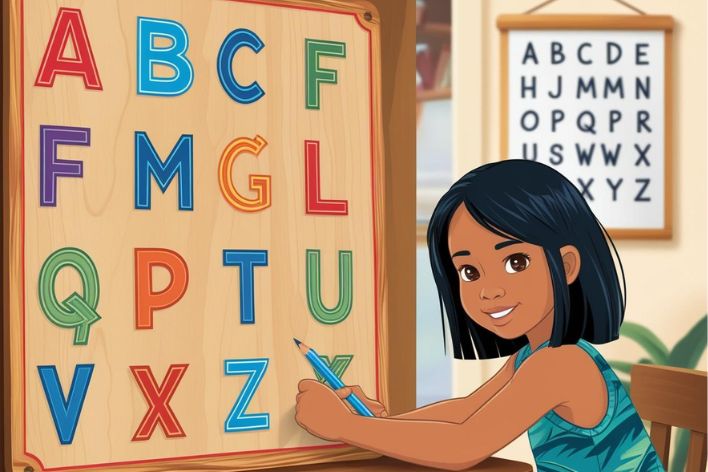
Symmetry letter pattern series patterns are styles crafted from a sequence of letters. These help children with the know-how of alphabetical order, spacing, and repetition samples. Children begin to notice letter sequence symmetry patterns when they see repeated or skipped letters in alphabetical order.
Examples of Letter Patterns:
-
A, C, E, G, I
➤ Rule: Skip every 2nd letter. -
B, D, F, H, J
➤ Rule: Begin with B, bypass one letter each time. -
Z, X, V, T
➤ Rule: Reverse alphabet journey, grade by grade. -
M, N, O, M, N, O
➤ Rule: Repetition of a series of letters.
These letter sequence symmetry patterns amplify language acquisition with the aid of connecting alphabetical data to reasonable order.
2. Number Patterns – Math in Motion
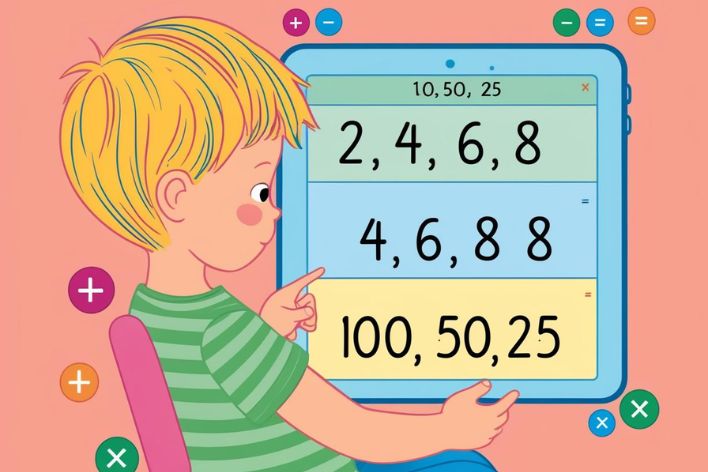
Number patterns form the muse for maximum mathematical steps. They illustrate how numbers upload, subtract, or compare with every different.
Most commonplace varieties of Number Patterns:
-
Pattern: 3, 6, 9, 12
Rule: Add three. -
Decreasing Sequence Pattern
Pattern: 50, forty, 30, 20
Rule: Take away 10 each time. -
Multiplication Pattern
Pattern: 2, 4,8, 16
Rule: Double each time (multiply by 2). -
Division Pattern
Pattern: 100, 50, 25, 12.5
Rule: Halve each time (divide through 2). -
Even and Odd Number Patterns
Even Numbers are numbers which divide by 2. Example - 2, 4, 6, 8
Odd Numbers are numbers not divisible by 2. Example - 1, 3, 5, 7
Rule:
Even numbers go up by 2, beginning at 2.
Odd numbers go up by 2, starting at 1.
Kids are requested to recite the example of pattern in every listing and state the rule upon which it's miles based totally. This is what makes the mind sharper and prepares kids for algebra and mathematics. These activities often include spotting letter sequence symmetry patterns among numeric or letter sequences.
3. Shape and Object Patterns – Learning with the Eyes
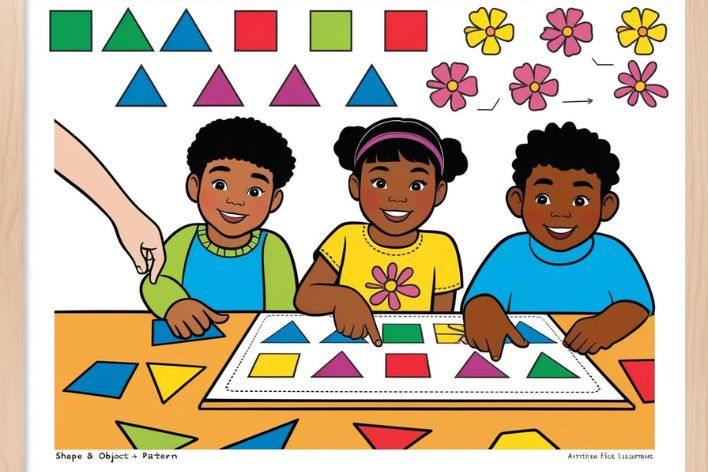
Shape patterns and item styles educate visible ordering and familiarize kids with geometry and symmetry and patterns.
Examples of Shape/Object Patterns:
-
<<<<
➤ Rule: Alternate purple and yellow squares. -
▲ ▲▲
➤ Rule: One triangle and then two triangles. -
🌸🌸🌸
➤ Rule: Flower sample through repetition.
These are mainly superb for illustrating symmetry and patterns because they make youngsters visually understand reflected and repeated shapes. A pattern is an arrangement of objects in a symmetrical manner, and these visual forms help reinforce that concept.
Advanced Letter Patterns – The Alphabet as a Playground
We recognize the fundamentals: A, B, C... But did you recognize you can flip the alphabet into a puzzle?
More Examples of Letter Sequence Symmetry Patterns:
Example 1:
Pattern: A, B, C, D, C, B, A
Rule: Go ahead four letters, then opposite.
Example 2:
Pattern: M, O, Q, S
Rule: Skip each 2nd letter beginning from M.
Example 3 :
Pattern: A, C, F, J
Rule: Add 1 letter, then 2, then three, and so forth.
These sorts of patterns assist in discovering:
-
Symmetry in letters (e.g., palindromes or replicate-letter orders)
-
Spacing and good judgment-primarily based progressions
-
Language shape via letter-based totally sequencing
Activity Tip: Let college students make their names into styles.
Example:
Name = ANAYA
Pattern = A, N, A, Y, A ➤ Symmetrical palindromic sample!
Complex Number Patterns – From Arithmetic to Intuition
Let’s take patterns in numbers a step similarly:
1. Fibonacci Pattern – Nature’s Favorite Numbers
Pattern: 0, 1, 1, 2, three, five, eight, thirteen
Rule: Each number is the sum of the two earlier than it.
Found in:
-
Spiral shells
-
Pinecones
-
Sunflower seeds
-
Pineapples
Children are interested when they discover this equal collection in flowers!
2. Prime Number Pattern
Pattern: 2, three, five, 7, 11, 13, 17
Rule: Only divisible by way of 1 and itself.
These assist in assuming seriously about patterns that aren’t “perfectly ordinary,” however, nevertheless follow guidelines.
Patterns in Shapes – Exploring Geometry Through Repetition
We can enlarge on visible and object patterns to consist of:
-
Rotational Symmetry (turning shapes)
-
Reflective Symmetry (reflect photo)
-
Tessellation (patterns that cover space without gaps)
Tessellation Examples:
-
Floor tiles in lavatories
-
Honeycomb in a beehive
-
Art by M.C. Escher (awesome for visible freshmen!)
Activity Idea: Provide paper triangles, squares, and hexagons. Let kids create patterns by means of rotating and flipping shapes to build tessellations.
Understanding Pattern Rules – How to Teach “Why”
When gaining knowledge of styles, the important question to train is:
“What is the guideline?”
Each sample must have:
-
A start line
-
A step
-
A route (forward/backward)
-
A common sense (math or visible)
Exercise:
Give four steps in a pattern. Ask students:
-
What comes next?
-
What rule did you comply with?
-
Can you damage the guideline?
This encourages questioning, mirrored image, and creativity.
Pattern-Based Activities for Critical Thinking
Odd One Out:
Show a list with one item that isn't in shape.
Example:
A, C, E, G, H
H is abnormal – doesn’t comply with the skipping pattern.
Pattern Completion Puzzle:
Give the begin and cease of a pattern. Let college students fill in the center.
Start: 1, three, _ , 7, nine ➤ Answer: five (upload 2)
Pattern Ladder:
Each step will increase complexity.
A ➤ AB ➤ ABC ➤ ABCD ➤ ?
Answer: ABCDE (adding one letter every time)
Symmetry and Patterns – Beauty in Balance
Symmetry and patterns supplement each other. A design that has symmetry is one in which half of the layout is a reflection of the other half of.
Symmetry in Patterns Examples:
-
Butterflies: Symmetrical wings with equal colours and shapes.
-
Snowflakes: Radial symmetry at its finest.
-
Rangoli Designs: Use repeated geometric motifs and mirror symmetry.
Interesting sample fact: The Taj Mahal is a fantastic example of pattern and symmetry and patterns, with architecture on each side of a middle line exactly mirrored.
Real-Life Examples of Patterns
Kids are bombarded with styles every day — now and again even unconsciously! They are constituted of nature, culture, music, or even our everyday life recurring. Let's explore some fun facts about patterns in ordinary life:
Rangoli and Mehndi – Symmetry with a Design
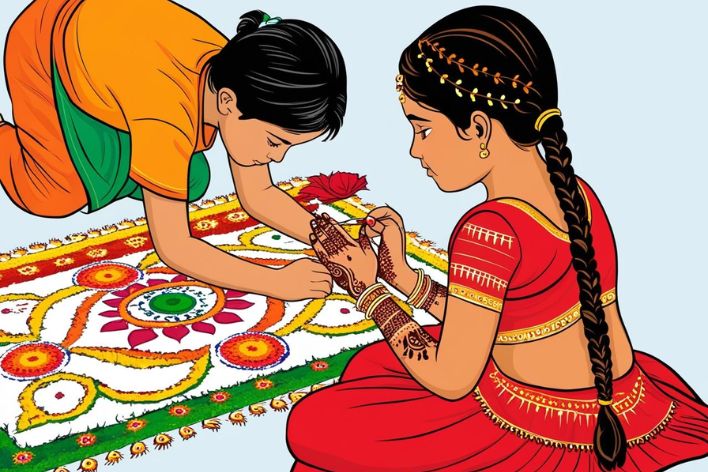
Rangoli is a traditional Indian decorative art seen during festivals. It often features letter sequence symmetry patterns and floral designs.
Mehndi patterns use mirrored sequences of leaves, shapes, and paisleys.
What you analyze: Mehndi and Rangoli teach symmetry and patterns, spatial awareness, and cultural math expression. They're filled with letter sequence symmetry patterns examples.
Music – Rhythm in Patterns
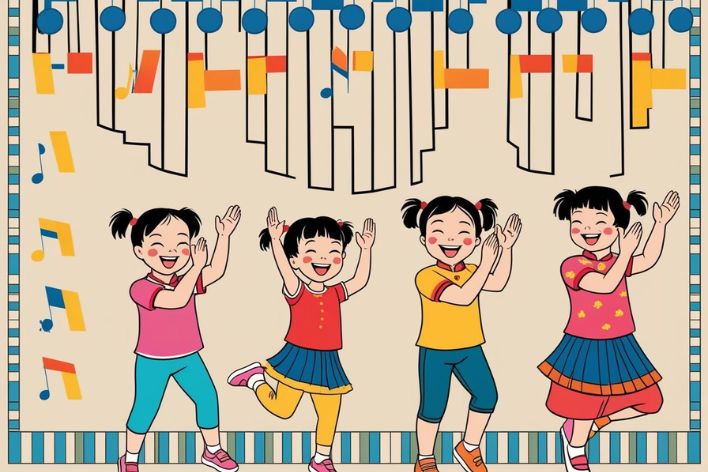
Music is complete with styles—from beats to lyrics. Patterns appear in rhythm, repetition, and harmony.
What you'll learn: Music teaches structure, emotion, and pattern recognition. Even beat combinations follow letter sequence symmetry patterns, especially in repeated refrains.
Nature – Patterns That Grow
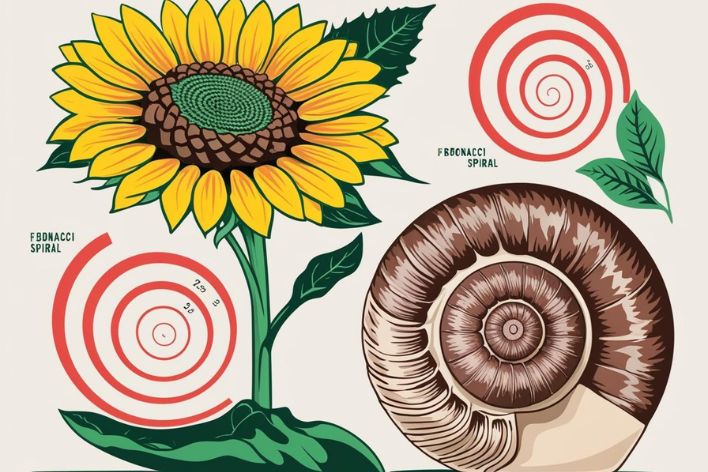
Nature is full of fun facts about patterns:
-
Fibonacci Sequence in pineapples and sunflowers
-
Spiral shells with mathematical structure
-
Animal patterns like tiger stripes or peacock feathers
-
A pattern is an arrangement of objects in a symmetrical manner
What you examine: Natural symmetry and patterns reflect design, logic, and balance.
Architecture – Patterns in Design
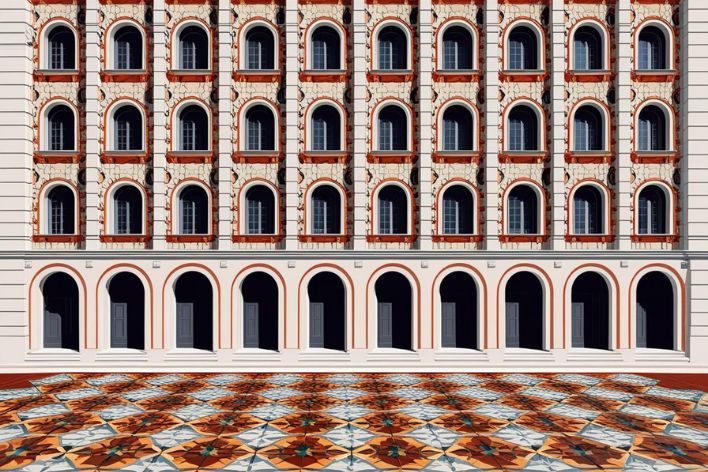
From skyscrapers to temples, structures reflect pattern is an arrangement of objects in a symmetrical manner.
Tiles, railings, domes—each uses letter sequence symmetry patterns in structural design.
What you may find out: Patterns create both strength and aesthetic beauty in buildings.
Calendar Days – Patterned Predictable Time
Time follows perfect letter sequence symmetry patterns examples:
-
Days repeat weekly
-
Seasons cycle predictably
-
Schedules and clocks follow structured increments
What you learn: Understanding time through patterns builds skills in planning and order.
Pattern Activities for Class Four
Practical and pictorial sports make it simple and fun to find out about patterns.
Recommended Pattern Activities:
- Shape Pattern Collage
➤ Make opportunities styles the use of paper cutouts. - Bead Bracelets
➤ Make a crimson-blue-purple-blue. Bead pattern bracelet. - Clap-Stamp-Clap Game
➤ Great kinesthetic hobby for identifying movement patterns. - Symmetry Fold Art
➤ Fold paper and reduce our shapes to study and replicate symmetry.
These sports make pattern popularity stick, construct reminiscence, and create motor capabilities—all of which can be made exciting! These reinforce memory, creativity, and exposure to letter sequence symmetry patterns in everyday life.
Things You Have learnt!
-
The concept of patterns lies at the heart of mathematical curiosity and wonder.
-
Recognizing patterns—like Rangoli designs, letter sequence symmetry patterns, or musical rhythms—enhances understanding and creativity.
-
Exploring symmetry and patterns teaches children about rhythm, structure, and design—skills valuable in both academics and everyday life.
-
Encourage kids to:
-
Identify every example of a pattern they see
-
Ask, “What’s the rule?”
-
Look for fun facts about patterns in their surroundings
-
By exploring, creating, and questioning patterns daily, one develops into a stronger thinker, problem solver, and lifelong learner.
FAQs
1. What is a math pattern?
A math pattern is an arrangement or correlation that obeys a chosen rule.
It may involve numbers, shapes, or objects repeating or transforming in a regular way.
2. What are the 12 patterns of nature?
The 12 patterns of nature include symmetry, spirals, fractals, stripes, spots, waves, tessellations, meanders, cracks, flows, chaos, and bubbles.
Natural patterns appear in animals, plants, landscapes, and weather.
3. Why is 1.618 significant?
1.618 is referred to as the Golden Ratio, usually found in nature, art pieces, and buildings. It is a symbol of first-class proportion and equilibrium, found in seashells, vegetation, and well-known houses.
4. What is sample rule 2 4 6 8?
The rule is to work 2 to each previous range in the set.
This forms an increasing sample of even numbers.
Practice Worksheets :
Click here for the practice worksheets --
Easy Level Worksheets
Intermediate Level Worksheets
Advanced Level Worksheets
CBSE Schools In Popular Cities
- CBSE Schools in Bangalore
- CBSE Schools in Mumbai
- CBSE Schools in Pune
- CBSE Schools in Hyderabad
- CBSE Schools in Chennai
- CBSE Schools in Gurgaon
- CBSE Schools in Kolkata
- CBSE Schools in Indore
- CBSE Schools in Sonipat
- CBSE Schools in Delhi
- CBSE Schools in Rohtak
- CBSE Schools in Bhopal
- CBSE Schools in Aurangabad
- CBSE Schools in Jabalpur
- CBSE Schools in Jaipur
- CBSE Schools in Jodhpur
- CBSE Schools in Nagpur
- CBSE Schools in Ahmednagar
- CBSE School In Tumkur











